全国高考英语试题及答案全国卷3
全国卷Ⅲ英语高考真题(含答案)
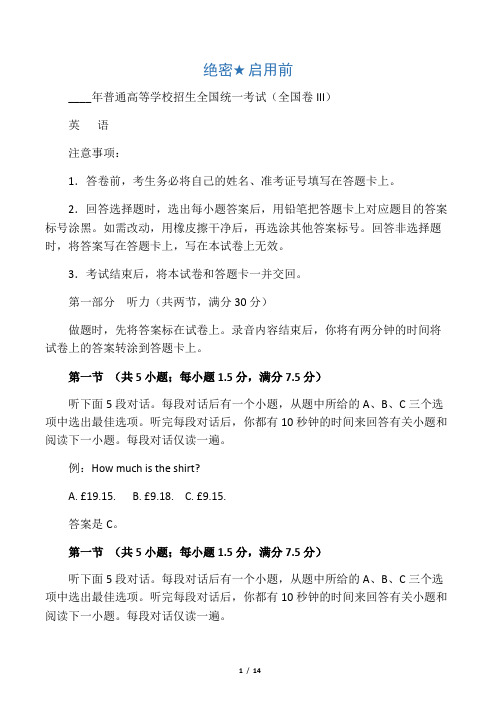
绝密★启用前____年普通高等学校招生全国统一考试(全国卷III)英语注意事项:1.答卷前,考生务必将自己的姓名、准考证号填写在答题卡上。
2.回答选择题时,选出每小题答案后,用铅笔把答题卡上对应题目的答案标号涂黑。
如需改动,用橡皮擦干净后,再选涂其他答案标号。
回答非选择题时,将答案写在答题卡上,写在本试卷上无效。
3.考试结束后,将本试卷和答题卡一并交回。
第一部分听力(共两节,满分30分)做题时,先将答案标在试卷上。
录音内容结束后,你将有两分钟的时间将试卷上的答案转涂到答题卡上。
第一节(共5小题;每小题1.5分,满分7.5分)听下面5段对话。
每段对话后有一个小题,从题中所给的A、B、C三个选项中选出最佳选项。
听完每段对话后,你都有10秒钟的时间来回答有关小题和阅读下一小题。
每段对话仅读一遍。
例:How much is the shirt?A. £19.15.B. £9.18.C. £9.15.答案是C。
第一节(共5小题;每小题1.5分,满分7.5分)听下面5段对话。
每段对话后有一个小题,从题中所给的A、B、C三个选项中选出最佳选项。
听完每段对话后,你都有10秒钟的时间来回答有关小题和阅读下一小题。
每段对话仅读一遍。
例:How much is the shirt?A. £19.15.B. £9.18.C. £9.15.答案是C。
1. Where does the conversation probably take place?A. In a library.B. In a bookstore.C. In a classroom.2. How does the woman feel now?A. Relaxed.B. Excited.C. Tired.3. How much will the man pay?A. $520.B. $80.C. $100.4. What does the man tell Jane to do?A. Postpone his appointment.B. Meet Mr. Douglas.C. Return at 3 o’clock.5. Why would David quit his job?A. To go back to school.B. To start his own firm.C. To work for his friend.第二节(共15小题;每小题1.5分,满分22.5分)听下面5段对话或独白。
2020年全国卷Ⅲ英语高考试题及答案(word版)
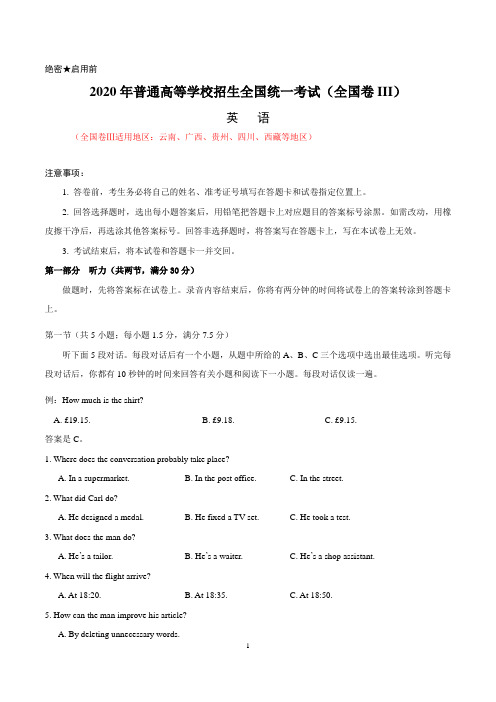
绝密★启用前2020年普通高等学校招生全国统一考试(全国卷III)英语(全国卷Ⅲ适用地区:云南、广西、贵州、四川、西藏等地区)注意事项:1. 答卷前,考生务必将自己的姓名、准考证号填写在答题卡和试卷指定位置上。
2. 回答选择题时,选出每小题答案后,用铅笔把答题卡上对应题目的答案标号涂黑。
如需改动,用橡皮擦干净后,再选涂其他答案标号。
回答非选择题时,将答案写在答题卡上,写在本试卷上无效。
3. 考试结束后,将本试卷和答题卡一并交回。
第一部分听力(共两节,满分30分)做题时,先将答案标在试卷上。
录音内容结束后,你将有两分钟的时间将试卷上的答案转涂到答题卡上。
第一节(共5小题;每小题1.5分,满分7.5分)听下面5段对话。
每段对话后有一个小题,从题中所给的A、B、C三个选项中选出最佳选项。
听完每段对话后,你都有10秒钟的时间来回答有关小题和阅读下一小题。
每段对话仅读一遍。
例:How much is the shirt?A. £19.15.B. £9.18.C. £9.15.答案是C。
1. Where does the conversation probably take place?A. In a supermarket.B. In the post office.C. In the street.2. What did Carl do?A. He designed a medal.B. He fixed a TV set.C. He took a test.3. What does the man do?A. He’s a tailor.B. He’s a waiter.C. He’s a shop assistant.4. When will the flight arrive?A. At 18:20.B. At 18:35.C. At 18:50.5. How can the man improve his article?A. By deleting unnecessary words.B. By adding a couple of points.C. By correcting grammar mistakes.第二节(共15小题;每小题1.5分,满分22.5分)听下面5段对话或独白。
2023年新高考全国卷英语试题及答案
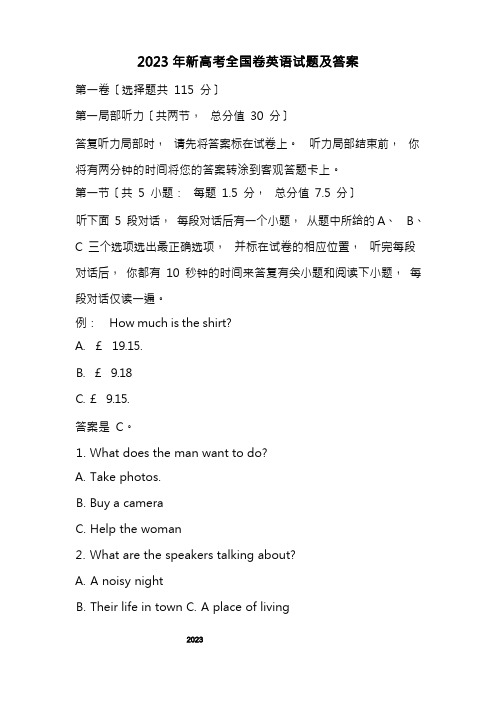
第一卷〔选择题共 115 分〕第一局部听力〔共两节,总分值 30 分〕答复听力局部时,请先将答案标在试卷上。
听力局部结束前,你将有两分钟的时间将您的答案转涂到客观答题卡上。
第一节〔共 5 小题:每题 1.5 分,总分值 7.5 分〕听下面 5 段对话,每段对话后有一个小题,从题中所给的 A、 B、C 三个选项选出最正确选项,并标在试卷的相应位置,听完每段对话后,你都有 10 秒钟的时间来答复有关小题和阅读下小题,每段对话仅读一遍。
例: How much is the shirt?A. £ 19.15.B. £ 9.18C. £ 9.15.答案是 C。
1. What does the man want to do?A. Take photos.B. Buy a cameraC. Help the woman2. What are the speakers talking about?A. A noisy nightB. Their life in townC. A place of living3. Where is the man now ?A. On his wayB. In a restaurantC. At home4. What will Celia do ?A. Find a playerB. Watch a gameC. Play basketball5. What day is it when the conversation takes place ?A. SaturdayB. SundayC. Monday第二节〔共 15 小题:每题 1.5 分,总分值 22.5 分〕听下面 5 段对话。
每段对话有几个小题,从题中所给的 A、 B、C 三个选项中选出的最正确选项,并标在试卷的相应位置。
听每段对话前,你将有时间阅读各个小题,每题 5 秒钟;听完后,各小题给出 5 秒钟的做答时间。
2020年高考全国卷Ⅲ英语(含答案)

2020年高考全国卷Ⅲ英语(含答案)-CAL-FENGHAI-(2020YEAR-YICAI)_JINGBIAN绝密★启用前2020年普通高等学校招生全国统一考试(全国卷III)英语注意事项:1. 答卷前,考生务必将自己的姓名、准考证号填写在答题卡和试卷指定位置上。
2. 回答选择题时,选出每小题答案后,用铅笔把答题卡上对应题目的答案标号涂黑。
如需改动,用橡皮擦干净后,再选涂其他答案标号。
回答非选择题时,将答案写在答题卡上,写在本试卷上无效。
3. 考试结束后,将本试卷和答题卡一并交回。
第一部分听力(共两节,满分30分)做题时,先将答案标在试卷上。
录音内容结束后,你将有两分钟的时间将试卷上的答案转涂到答题卡上。
第一节(共5小题;每小题1.5分,满分7.5分)听下面5段对话。
每段对话后有一个小题,从题中所给的A、B、C三个选项中选出最佳选项。
听完每段对话后,你都有10秒钟的时间来回答有关小题和阅读下一小题。
每段对话仅读一遍。
例:How much is the shirtA. £19.15.B. £9.18.C. £9.15.答案是C。
1. Where does the conversation probably take place?A. In a supermarket.B. In the post office.C. In the street.2. What did Carl do?A. He designed a medal.B. He fixed a TV set.C. He took a test.3. What does the man do?A. He’s a tailor.B. He’s a waiter.C. He’s ashop assistant.4. When will the flight arrive?A. At 18:20.B. At 18:35.C. At18:50.5. How can the man improve his article?A. By deleting unnecessary words.B. By adding a couple of points.C. By correcting grammar mistakes.第二节(共15小题;每小题1.5分,满分22.5分)听下面5段对话或独白。
2021年高考英语试题及参考答案(全国卷)
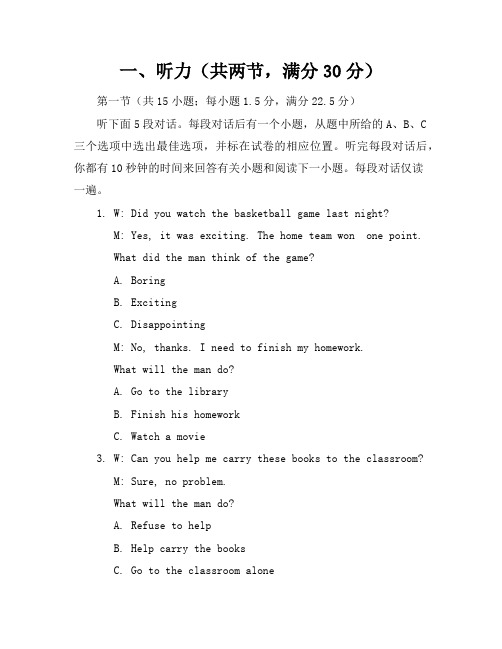
一、听力(共两节,满分30分)第一节(共15小题;每小题1.5分,满分22.5分)听下面5段对话。
每段对话后有一个小题,从题中所给的A、B、C 三个选项中选出最佳选项,并标在试卷的相应位置。
听完每段对话后,你都有10秒钟的时间来回答有关小题和阅读下一小题。
每段对话仅读一遍。
1. W: Did you watch the basketball game last night?M: Yes, it was exciting. The home team won one point.What did the man think of the game?A. BoringB. ExcitingC. DisappointingM: No, thanks. I need to finish my homework.What will the man do?A. Go to the libraryB. Finish his homeworkC. Watch a movie3. W: Can you help me carry these books to the classroom?M: Sure, no problem.What will the man do?A. Refuse to helpB. Help carry the booksC. Go to the classroom alone(此处省略部分听力试题,后续听力试题及答案将在第二部分继续呈现)二、阅读理解(共两节,满分40分)第一节(共15小题;每小题2分,满分30分)阅读下列短文,从短文后各题所给的A、B、C、D四个选项中,选出最佳选项,并在答题卡上将该选项涂黑。
ALast weekend, I went to a small town in the countryside to escape the hustle and bustle of city life. The moment I arrived, I was greeted the fresh air and peaceful surroundings. I decided to stay at a local inn, which was known for its cozy atmosphere and delicious food.When I returned to the inn, I was treated to a hearty meal consisting of local specialties. I shared my hiking experience with the innkeeper, who listened attentively and even offered some tips for my next trip.1. Why did the author go to the countryside?A. To visit friendsB. To enjoy the peaceful surroundingsC. To attend a conferenceD. To try local foodA. A restaurantB. A hiking trailC. A shopping mallD. A tourist spot(此处省略部分阅读理解试题,后续阅读理解试题及答案将在第三部分继续呈现)三、语言知识运用(共两节,满分45分)第一节(共20小题;每小题1.5分,满分30分)完形填空阅读下面短文,从短文后各题所给的A、B、C、D四个选项中,选出最佳选项,并在答题卡上将该选项涂黑。
2019年高考英语全国卷3(附参考答案及详解)
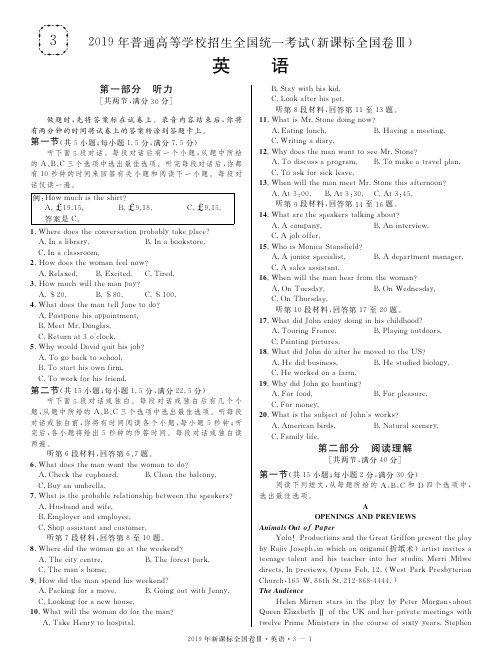
;643G<674 H63<G 3<EA06<16; HF +23<>"4-/6 -E 526 H645
;643G<674-E1-<56/@-7>7FE>423-< >76526/46A=64 +23<646'
-_67> :><G&)A6K><;67 :><G&C>4-<ห้องสมุดไป่ตู้:0 >76 5>?3<G -<
"#':2312@A>F.3AAF-0G-5-3EF-0>763<5676456;3<)/6731><
2345-7F*
)'2*'$)&#;9("3<)%45=
*'+,4291'4*:4=
+'>)$'&("*=
N';*(,4+?4*('4(,!4*(95@=
I
]-7 :64567<;643G<674&+23<>><;354731210A50762>=6
W>AA3><-&)AH>^&T>71C>1-H4"><;H6>53<G526/ 2><;4;-.<
#',-. /012.3AA526/><@>F*
)'Z!"'
*'Z9"' +'Z#""'
2020年高考英语全国卷Ⅲ语法填空试题及答案详解
2020年高考英语全国卷Ⅲ语法填空试题及答案详解(全国卷Ⅲ适用地区:云南、广西、贵州、四川、西藏等地区)请看试题:第二节(共10小题;每小题1.5分,满分15分)阅读下面短文,在空白处填入1个适当的单词或括号内单词的正确形式。
In ancient China lived an artist. 61 paintings were almost lifelike. The artist’s reputation had made him proud. One day the emperor wanted to get his portrait (画像) done so he called all great artists to come and present their 62 (fine) work, so that he could choose the best. The artist was sure he would. 63 (choose), but when he presented his masterpiece to the emperor’s chief minister, the old nan laughed. The wise old man told him to travel to the Li River~perhaps he could learn a little from the greatest artist in the world.Filled with 64 (curious), the artist packed his bags and left. 65 he asked the villagers on the banks of the river where he could find the legendary (传奇的) artist, they smiled and 66 (point) down the river. The next morning he hired a boat and set out 67 (find) the well-known painter. As the small boat moved 68 (gentle) along the river he was left speechless by the mountains being silently reflected in the water. He passed milky white waterfalls and mountains in many shades of blue. And when he saw the mists rising from the river and the soft clouds 69 (surround) the mountain tops, he was reduced to tears. The artist was finally humbled (谦卑) by the greatest artist 70 earth, Mother Nature.请看译文:在古代中国有一位艺术家,他的画几乎栩栩如生。
2018年高考英语全国卷3真题及答案
2018年高考英语全国卷3真题及答案e to Holker Hall & Gardens。
a beautiful n for visitors to enjoy。
To get here by car。
simply follow the brown signs on the A590 from JB6.M6.The approximate travel times are 20 minutes from Windermere。
25 minutes from Kendal。
45 minutes from Lancaster。
and 1 hour 30 minutes from XXX。
the XXX Cark-in-Cartmel。
XXX。
Lancaster。
XXX。
Our opening times are from Sunday to Friday (closed on Saturdays) from 11:00 am to 4:00 pm。
een 30 March and 2 November。
n charges for the Hall and Gardens are £12.00 for adults and £8.00 for gardens only。
For groups。
the charges are £9.00 for the Hall and £5.50 for gardens only。
We also have special events that you can attend。
such as the Producers’ Market on 13th April。
This event allows you to XXX food and drinks。
meet the producers。
and get some excellent recipe ideas。
(完整版)2018年高考英语全国3卷试题及答案
2018年普通高等学校招生全国统一考试(课标全国卷Ⅲ)英语第一部分听力(共两节,满分30分)第二部分阅读理解(共两节,满分40分)第一节(共15小题;每小题2分,满分30分)阅读下列短文,从每题所给的A、B、C和D四个选项中,选出最佳选项。
AWelcome to Holker Hall & GardenVisitor InformationHow to Get to HolkerBy car: Follow brown signs on A590 from. J36, M6. Approximate travel times: Windermere—20 minutes, Kendal—25 minutes, Lancaster—45 minutes, Manchester—l hour 30minutesBy rail: the nearest station is Cark-in-Cartmel with trains to Carnforth. Lancaster and Preston for connections to major cities & airports.Opening timesSunday-Friday(closed on Saturday) 11:00 am-4;00pm, 30 March-2nd November.Admission ChargesHall & Gardens GardensAdults: £12.00 £8.00Gropes: £9.00Special EventsProducers Market 13th AprilJoin us to taste a variety of fresh local food and drinks. Meet the producers and get some excellent recipe ideas.Holker Garden Festival 30th MayThe event celebrates its 22nd anniversary with a great show of the very best of gardening, making it one of the most popular events in the gardening.National Garden Day 28th AugustHolker once again opens its gardens in aid of the disadvantaged. For just a small donation you can take a tour with our garden guide.Winter Market 8th NovemberThis is an event for all the family! Wander among a variety of shops selling gifts while enjoying a live music show and nice street entertainment.21. How long does it probably take a tourist to drive to Holker from Manchester?A.20 minutes.B. 25 minutes.C.45 minutes.D. 90 minutes.22. How much should a member of a tour group pay a visit to Hall & Gardens?A. £12.00.B. £9.00.C. £8.00D. £5.5023. Which event will you go to if you want to see a live music show?A. Producers Market.B. Holker Garden FestivalC. National Garden Day.D. Winter MarketBCities usually have a good reason for being where they are, like a nearby port on river. People settle in theseplaces because they are easy to get to and naturally suited to communications and trade. New York City, for example, is near a large harbour at the mouth of the Hudson River. Over 300 years its population grew gradually from 800 people to 8 million. But not all cities develop slowly over a long period of time. Boom towns grow from nothing almost overnight. In 1896 Dawson Canada was unmapped wilderness(荒野). But gold was discovered there in 1897 and two years later, it was one of the largest cities in the West, with a population of 30,000.Dawson did not have any of the natural conveniences of cities like London or Paris. People went there for gold. They travelled over snow-covered mountains and sailed hundreds of miles up icy rivers. The path to Dawson was covered with thirty feet of wet snow that could fall without warning. An avalanche (雪崩) once closed the path, killing 63 people. For many who made it to Dawson, however, the rewards were worth the difficult trip. Of the first 20,000 people who dug for gold, 4,000 got rich. About 100 of these stayed rich men for the rest of their lives.But no matter how rich they were, Dawson was never comfortable. Necessities like food and wood were very expensive. But soon, the gold that Dawson depended on had all been found. The city was crowded with disappointed people with no interest in settling down, and when they heard there were new gold discoveries in Alaska, they left Dawson City as quickly as they had come. Today, people still come and go to see where the Canadian gold rush happened. Tourism is now the chief industry of Dawson City - its present population is 762.24. What attracted the early settlers to New York City?A. Its business culture.B. Its small population.C. Its geographical position.D. Its favourable climate.25. What do we know about those who first dug for gold in Dawson?A. Two thirds of them stayed there.B. One out of five people got rich.C. Almost everyone gave up.D. Half of them died.26. What was the main reason for many people to leave Dawson?A. They found the city too crowded.B. They wanted to try their luck elsewhere.C. They were unable to stand the winter.D. They were short of food.27. What is the text mainly about?A. The rise and fall of a city.B. The gold rush in Canada.C. Journeys into the wilderness.D. Tourism in Dawson.CWhile famous foreign, architects are invited to lead the designs of landmark buildings in China such as the new CCTV tower and the National Center for the Performing Arts, many excellent Chinese architects are making great efforts to take the center stage.Their efforts have been proven fruitful. Wang Shu a 49-year-old Chinese architect, won the 2012 Pritzker Architecture Prize -which is often referred to as the Nobel Prize in architecture--on February 28. He is the first Chinese citizen to win this award.Wang serves as head of the Architecture Department at the China Department at the China Academy of Art(CAA). His office is located at the Xiangshan campus (校园)of the university in Hangzhou, Zhejiang Province. Many buildings on the campus are his original creations.The style of the campus is quite different from that of most Chinese universities. Many visitors were amazed by the complex architectural space and abundant building types. The curves (曲线)of the buildings perfectly match the rise and fall of hills, forming a unique view.Wang collected more than 7 million abandoned bricks of different ages. He asked the workers to use traditional techniques to make the bricks into walls, roofs and corridors. This creation attracted a lot of attention thanks to its mixture of modern and traditional Chinese elements.Wang’s works show a deep understanding of modern architecture and a good knowledge of traditions.Through such a balance, he had created a new type of Chinese architecture, said Tadao Ando, the winner of the1995 Pritzker Prize.Wang believes traditions should not be sealed in glass boxes at museums. “That is only evidence that traditions once existed, “ he said.“Many Chinese people have a misunderstanding of traditions. They think tradition means old things from the past. In fact, tradition also refers to the things that have been developing and that are still being created, “he said.“Today, many Chinese people are learning Western styles and theories rather than focusing on Chinese traditions. Many people tend to talk about traditions without knowing what they really are," said Wang.The study of traditions should be combined, with practice. Otherwise, the recreation of traditions would be artificial and empty, he said.28. Wang's winning of the prize means that Chinese architects areA. following the latest world trendB. getting international recognitionC. working harder than ever beforeD. relying on foreign architects29. What impressed visitors to the CAA Xiangshan campus most?A. Its hilly environment.B. Its large sizeC. Its unique style.D. Its diverse functions.30. What made Wang's architectural design a success?A. The mixture of different shapes.B. The balance of East and WestC. The use of popular techniquesD. The harmony of old and new.31. What should we do about Chinese traditions according to Wang?A. Spread them to the world.B. Preserve them at museums.C. Teach them in universities.D. Recreate them in practice.DAdults understand what if feels like to be flooded with objects. Why do we often assume that more is more when it comes to kids and their belongings? The good news is that I can help my own kids learn earlier than I did how to live more with less.I found the pre-holidays a good time to encourage young children to donate less-used things, and it worked. Because of our efforts, our daughter Georgia did decide to donate a large bag of toys to a little girl whose mother was unable to pay for her holiday due to illness. She chose to sell a few large objects that were less often used when we promised to put the money into her school fund (基金) (our kindergarten is serious about becoming a doctor).For weeks, I’ve been thinking of bigger, deeper questions. How do we make it a habit for them? And how do we train ourselves to help them live with, need and use less? Yesterday, I sat with my son, Shepherd, determined to test my own theory on this. I decided to play with him with only one toy for as long as it would keep his interest. I expected that one toy would keep his attention for about five minutes, ten minutes max. I chose a red rubber ball-simple, universally available. We passed it, he tried to put it in his mouth, he tried bouncing it, rolling it, sitting on it, throwing it. It was totally, completely enough for him. Before I knew it an hour had passed and it was time to move on to lunch.We both became absorbed in the simplicity of playing together. He had my full attention and I had his. My little experiment to find joy in a single object worked for both of us.32. What do the words “more is more” in paragraph 1 probably mean?A. The more, the better.B. Enough is enough.C. More money, more worries.D. Earn more and spend more.33. What made Georgia agree to sell some of her objects?A. Saving up for her holiday.B. Raising money for a poor girl.C. Adding the money to her fund.D. Giving the money to a sick mother.34. Why did the author play the ball with Shepherd?A. To try out an idea.B. To show a parent’s love.C. To train his attention.D. To help him start a hobby,.35. What can be a suitable title for the text?A. Take it or Leave it.B. A Lesson from Kids.C. Live More with Less.D. The Pleasure of Giving.第二节(共5小题;每小题2分,满分10分)根据短文内容,从短文后的选项中选出能填入空白处的最佳选项。
高考真题2019全国卷(1,2,3汇编)英语卷完型填空(含答案)
文档说明:1.本文档经过本人认真校对并排版,能力有限,难免有不良之处。
欢迎指出。
2.百度文库中看到的文档,可能会有不清、前后错乱等问题,是因为文档转换显示的问题;本文编排时是没有那些问题的。
下载后用应该没问题。
3.文档板式:中文字体是宋体五号;英文是TimesNewRoman小四。
页眉有内容提要,页脚有页码。
4.全国I卷适用地区:安徽、湖北、福建、湖南、山西、河北、江西、广东、河南、山东5.全国II卷适用地区:甘肃、青海、黑龙江、吉林、辽宁、宁夏、新疆、内蒙古、陕西、重庆6.全国III卷适用地区:云南、四川、广西、贵州、西藏高考真题2019年英语完形填空(含答案)全国卷一二三汇编2019年普通高等学校招生全国统一考试(全国卷I)英语完形填空(含答案)第三部分语言知识运用(共两节,满分45分)第一节(共20小题;每小题 1.5分,满分30分)阅读下面短文,从短文后各题所给的A、B、C和D四个选项中,选出可以填入空白处的最佳选项。
Everyyearabout40,000peopleattemptto climb Kilimanjaro,the highest mountaininAfrica.They41 withthemlotsofwaste.The42mightdamagethe beautyof the place.Theglaciers(冰川)aredisappearing,changingthe 43 of Kilimanjaro.Hearing these stories,I’m44 aboutthe place—otherdestinations are describedas“purernatural”experiences.However,Isoon 45 thatmuchhaschangedsincethedaysofdisturbing reportsof46amongtonsofrubbish.Ifinda47 mountain,withtoiletsatcamps andalongthepaths.Theenvironmentalchallengesare 48buttheeffortsmadeby theTanzaniaNationalParkAuthorityseemtobe 49.The bestof a Kilimanjaro 50 ,in myopinion,isn’treaching the top.Mountainsare 51 asspiritualplacesbymanycultures.This52 isespecially evidentonKilimanjaroas 53gothroughfiveecosystems(生态系统)inthespaceofafewkilometers.At thebase isa rainforest.It endsabruptlyat 3,000meters, 54 landsof low growing plants.Furtherup,theweather 55 —low clouds envelope the mountainsides,which are covered with thick grass.I 56twelveshadesofgreenfromwhereIstand.Above4,000metersisthe highland 57 :gravel(砾石),stonesandrocks. 58youclimbintoanarctic-like zonewith59snowandtheglaciersthatmaysoondisappear.DoesKilimanjaro 60 itsreputationasacrowdedmountainwithlines of touristsruiningtheatmosphereofpeace?Ifoundtheoppositetobetrue.141.A.keep B.mix C.connect D.bring42. A.stories B.buildings C.crowds D.reporters43. A.position B.age C.face 44. A.silent B.skeptical C.serious D.crazy45. A.discover B.argue C.decide D.advocate46. A.equipment B.grass C.camps D.stones47. A.remote B.quiet C.all D.clean48. A.new B.special C.significant D.necessary49. A.payingoff B.spreadingout C.blowingup D.fadingaway50. A.atmosphere B.experience C.experiment D.sight51. A.studied B.observed C.explored D.regarded52. A.view B.quality C.reason D.purpose53. A.scientists B.climbers C.locals D.officials54. A.holdingonto B.goingbackto C.livingupto D.givingwayto55. A.changes B.clears C.improves D.permits56. A.match B.imagine C.count D.add57. A.village B.desert C.road ke58. A.Obviously B.Easily C.Consequently D.Finally59. A.permanent B.little C.fresh D.artificial60. A.enjoy B.deserve C.save D.acquire2019年普通高等学校招生全国统一考试(全国卷II)英语完形填空(含答案)第三部分语言知识运用(共两节,满分45分)第一节(共20小题;每小题 1.5分,满分30分)阅读下面短文,从短文后各题所给的A、B、C和D四个选项中,选出可以填入空白处的最佳选项。
- 1、下载文档前请自行甄别文档内容的完整性,平台不提供额外的编辑、内容补充、找答案等附加服务。
- 2、"仅部分预览"的文档,不可在线预览部分如存在完整性等问题,可反馈申请退款(可完整预览的文档不适用该条件!)。
- 3、如文档侵犯您的权益,请联系客服反馈,我们会尽快为您处理(人工客服工作时间:9:00-18:30)。
绝密★启用前 6 月8日15:00—16:402016 年普通高等学校全国统一考试英语注意事项:本试卷分第I 卷(选择题)和第II 卷(非选择题)两部分。
考试结束后.将本试卷和答题卡一并交回。
第I卷注意事项:1.答第I 卷前,考考生务必将自己的姓名、考生号填写在答题卡上。
2.选出每小题答案后,用铅笔把答题卡上对应的题目的答案标号涂黑。
如需改动,用橡皮擦~干净后,在选涂其他答案标号。
不能答在本试卷,否则无效。
第一部分阅读理解(共两节,满分40 分)第一节(共15 小题;每小题 2 分,满分30 分)阅读下列短文,从每题所给的四个选项(A、B、C和 D)中,选出最佳选项,并在答题卡上将该项涂黑。
AMusicOpera at Music Hall: 1243 Elm Street. The season runs June through August, with additional performances in March and September. The Opera honors Enjoy the Arts membership discounts. Phone: 241-2742. .#Chamber Orchestra: The Orchestra plays at Memorial Hall at 1406 Elm Street, which offers several concerts from March through June. Call 723-1182 for more information. Symphony Orchestra:At Music Hall and Riverbend. For ticket sales, call 381-3300. Regular seasonruns September through May at Music Hall in summer at Riverbend. .College Conservatory of Music (CCM): Performances are on the main campus(校园)of the university, usually at Patricia Cobbett Theater. CCM organizes a variety of events, includingperformances by the well-known LaSalle Quartet, CCM’s Philharmonic Orchestra, and various groups of musicians presenting Baroque through modern music. Students with . cards can attend the events for free. A free schedule of events for each term is available by calling the box office at 556-4183. .Riverbend Music Theater: 6295 Kellogg Ave. Large outdoor theater with the closest seats under cover (price difference).Big name shows all summer long! Phone:232-6220. .3. Which number should you call if you want to see an operaA. 241-2742.B. 723-1182.C. 381-3300.D. 232-6220.4. When can you go to a concert by Chamber OrchestraA. February.B. May.C. August.D. November.5.Where can students go for free performances with their . cardsA. Music Hall.B. Memorial Hall.C. Patricia Cobbett Theater.D. Riverbend Music Theater.6. How is Riverbend Music Theater different from the other placesA. It has seats in the open air.B. It gives shows all year round.C. It offers membership discounts.D. It presents famous musical works.BOn one of her trips to New York several years ago, Eudora Welty decided to take a couple ofNew York friends out to dinner. They settled in at a comfortable East Side cafe and within minutes, another customer was approaching their table.“H ey, aren’t you from Mississippi”the elegant, white-haired writer remembered being asked by the stranger. “I’m from Mississippi too. ”Without a second thought, the woman joined the Welty party. When her dinner partner showed up, she also pulled up a chair.“T hey began telling me all the news of Mississippi, ”Welty said. “I didn’t know what my NewYork friends were thinking. ”Taxis on a rainy New York night are rarer than sunshine. By the time the group got up to leave, it was pouring outside. Welty ’s new friends immediately sent a waiter to find a cab. Heading back downtown toward her hotel, her big-city friends were amazed at the turn of eventsthat had changed their Big Apple dinner into a Mississippi.“M y friends said: ‘N ow we believe your stories, ’”Welty added.“A nd I said: ‘N ow you know. These are the people that make me write them. ’”Sitting on a sofa in her room, Welty, a slim figure in a simple gray dress, looked pleased withthis explanation.“I don ’t make them up, ”s he said of the characters in her fiction these last 50 or so years. “I don’t have to.”Beauticians, bartenders, piano players and people with purple hats, Welty’s people come from afternoons spent visiting with old friends, from walks through the streets of her native Jackson, Miss., from conversations overheard on a bus. It annoys Welty that, at 78, her left earhas now given out. Sometimes, sitting on a bus or a train, she hears only a fragment( 片段 ) of a particularly interesting story.7. What happened when Welty was with her friends at the cafeA. Two strangers joined her.B. Her childhood friends came in.C. A heavy rain ruined the dinner.D. Some people held a party there.8. The underlined word “t hem ”in Paragraph 6 refers to Welty ’s.A. readersB. partiesC. friendsD. stories9. What can we learn about the characters in Welty ’s fictionA. They live in big cities.B. They are mostly women.C. They come from real life.D. They are pleasure seekers.CIf you are a fruit grower —or would like to become one —take advantage of Apple Day to see what ’s around. It ’s called Apple Day but in practice it ’s more like Apple Month. The day itself is onOctober 21, but since it has caught on, events now spread out over most of October around Britain.Visiting an apple event is a good chance to see, and often taste, a wide variety of apples. To people who are used to the limited choice of apples such as Golden Delicious and Royal Gala in supermarkets, it can be quite an eye opener to see the range of classical apples still in existence, such as Decio which was grown by the Romans. Although it doesn ’t taste of anything special, it ’s still worth a try, as is the knobbly( 多疙瘩的) Cat’s Head which is more of a curiosity than anything else.There are also varieties developed to suit specific local conditions. One of the very best varieties for eating quality is Orleans Reinette, but you’l l need a warm, sheltered place with perfect soil to grow it, so it ’s a pipe dream for most apple lovers who fall for it.At the events, you can meet expert growers and discuss which ones will best suit your conditions, and because these are family affairs, children are well catered for with apple-themedfun and games.Apple Days are being held at all sorts of places with an interest in fruit, including stately gardens and commercial orchards( 果园 ).If you want to have a real orchard experience, try visiting the National Fruit Collection at Brogdale, near Faversham in Kent.10.What can people do at the apple eventsA. Attend experts lec’t ures.B. Visit fruit-loving families.C. Plant fruit trees in an orchard.D. Taste many kinds of apples.11.What can we learn about DecioA. It is a new variety.B. It has a strange look.C. It is rarely seen now.D. It has a special taste.12. What does the underlined phrase “ a pipe dream in P”a ragraph 3meanA. A practical idea.B. A vain hope.brilliant plan. D. A selfish desire.13.What is the author ’u r s p o p s e in writing the textA. To show how to grow apples.B .To introduce an apple festival.C. To help people select apples.D. To promote apple research.DBad news sells. If it bleeds, it leads. No news is good news, and good news is no news. Thoseare the classic rules for the evening broadcasts and the morning papers. But now thatinformation is being spread and monitored( 监控) in different ways, researchers are discoveringnew rules. By tracking people -mail’s a s n d e online posts, scientists have found that good newscan spread faster and farther than disasters and sob stories.“The ‘if it bleeds ’ rule works for mass media, ” says Jonah Berger, a scholar at the University of Pennsylvania. “They want your eyeballs and don ’t care how you ’re feeling. But when you share astory with your friends, you care a lot more how they react. You don ’t want them to think of you as a Debbie Downer. ”Researchers analyzing word-of-mouth communication —e-mails, Web posts and reviews,face-to-face conversations —found that it tended to be more positive than negative( 消极的), butthat didn ’n tecessarily mean people preferred positive news. Was positive news shared moreoften simply because people experienced more good things than bad things To test for thatpossibility, Dr. Berger looked at how people spread a particular set of news stories: thousands ofarticles on The New York Times ’ website. He and a Penn colleague analyzed the-mailed ”“most elist for six months. One of his first findings was that articles in the science section were muchmore likely to make the list than non-science articles. He found that science amazed Times ’readers and made them want to share this positive feeling with others.Readers also tended to share articles that were exciting or funny, or that inspired negativefeelings like anger or anxiety, but not articles that left them merely sad. They needed to bearoused(激发) one way or the other, and they preferred good news to bad. The more positive anarticle, the more likely it was to be shared, as Dr. Berger explains in his new book, s: “ C Why Things Catch On. ”12 .What do the classic rules mentioned in the text apply toA. News reports.B. Research papers.C .Private e-mails. D. Daily conversations.14. What can we infer about people like Debbie DownerA. They’r e socially inactive.B. They’r e good at telling stories.C. They’r e inconsiderate of others.D. They ’r e careful with their words.15.Which tended to be the most e-mailed according to Dr. Berger ’s researchA . Sports new. B. Science articles.C. Personal accounts.D. Financial reviews.15 .What can be a suitable title for the textA. Sad Stories Travel Far and WideB .Online News Attracts More PeopleC. Reading Habits Change with the TimesD. Good News Beats Bad on Social Networks第二节(共5 小题;每小题 2 分,满分10 分 )根据短文内容,从短文后的选项中选出能填入空白处的最佳选项。
